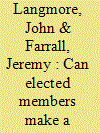| Srl | Item |
| 1 |
ID:
144466


|
|
|
|
|
| Summary/Abstract |
The UN Charter gives the Security Council the extraordinary function of being responsible for international peace and security. Although the Permanent Five members are disproportionately powerful, there is nevertheless scope for elected members to influence the Council's decisionmaking processes during their short two-year terms. This article uses Australia's membership in 2013 and 2014 as a case study to examine why states seek election to the Council, means through which they can strengthen their influence, how they can navigate P5 power, how successful they are in achieving their objectives, and how the effectiveness of both elected members and the Council as a whole could be improved. Despite the substantial constraints facing elected members, those that are imaginative and industrious can nevertheless make influential contributions to achievement of the Council's purposes.
|
|
|
|
|
|
|
|
|
|
|
|
|
|
|
|
| 2 |
ID:
147637


|
|
|
|
|
| Summary/Abstract |
There is scepticism about whether a state like Australia can secure its interests and exercise influence on the United Nations Security Council (UNSC). A case study of Australia’s experience as a UNSC member in 2013–2014 shows that it directly influenced UNSC decision-making in a number of ways: first, in the response to the MH17 incident; second, pushing forward UNSC practice through the first-ever resolutions on both ‘small arms and light weapons’ and police in peacekeeping; and third, as chair of three sanctions committees, influencing the decision-making environment towards greater transparency. While Australia did not achieve all its objectives, it made its views well-known. A second case study demonstrates that Australia’s opportunities to influence UNSC decision-making are not limited to stints of membership. Australia was able to achieve many of its foreign policy objectives in East Timor in 1999 through strategically engaging with key UNSC players through an informal diplomatic grouping: the Core Group on East Timor. Both case studies show that Australia’s diplomatic engagement with the UNSC is desirable, necessary and strategic, whether or not it is a current or prospective member.
|
|
|
|
|
|
|
|
|
|
|
|
|
|
|
|